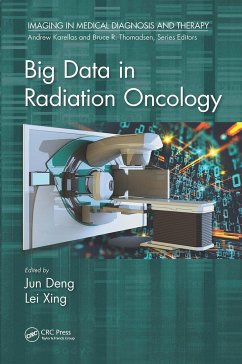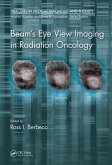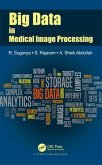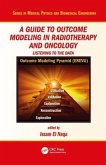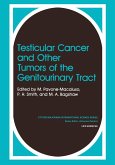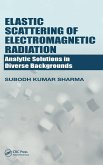Big Data in Radiation Oncology
Herausgeber: Deng, Jun; Xing, Lei
Big Data in Radiation Oncology
Herausgeber: Deng, Jun; Xing, Lei
- Gebundenes Buch
- Merkliste
- Auf die Merkliste
- Bewerten Bewerten
- Teilen
- Produkt teilen
- Produkterinnerung
- Produkterinnerung
This book gives readers an in-depth look into how big data is having an impact on the clinical care of cancer patients. Basic principles are covered early on, and clinical applications become the focus thereafter. A final section introduces emerging models for cancer prevention and detection.
Andere Kunden interessierten sich auch für
![Beam's Eye View Imaging in Radiation Oncology Beam's Eye View Imaging in Radiation Oncology]() Beam's Eye View Imaging in Radiation Oncology275,99 €
Beam's Eye View Imaging in Radiation Oncology275,99 €![Big Data in Medical Image Processing Big Data in Medical Image Processing]() R. SuganyaBig Data in Medical Image Processing284,99 €
R. SuganyaBig Data in Medical Image Processing284,99 €![A Guide to Outcome Modeling In Radiotherapy and Oncology A Guide to Outcome Modeling In Radiotherapy and Oncology]() A Guide to Outcome Modeling In Radiotherapy and Oncology204,99 €
A Guide to Outcome Modeling In Radiotherapy and Oncology204,99 €![Monte Carlo Techniques in Radiation Therapy Monte Carlo Techniques in Radiation Therapy]() Monte Carlo Techniques in Radiation Therapy275,99 €
Monte Carlo Techniques in Radiation Therapy275,99 €![Testicular Cancer and Other Tumors of the Genitourinary Tract Testicular Cancer and Other Tumors of the Genitourinary Tract]() M. Pavone-MacAlusoTesticular Cancer and Other Tumors of the Genitourinary Tract41,99 €
M. Pavone-MacAlusoTesticular Cancer and Other Tumors of the Genitourinary Tract41,99 €![Laser-Matter Interaction for Radiation and Energy Laser-Matter Interaction for Radiation and Energy]() Hitendra K. MalikLaser-Matter Interaction for Radiation and Energy215,99 €
Hitendra K. MalikLaser-Matter Interaction for Radiation and Energy215,99 €![Elastic Scattering of Electromagnetic Radiation Elastic Scattering of Electromagnetic Radiation]() Subodh Kumar SharmaElastic Scattering of Electromagnetic Radiation206,99 €
Subodh Kumar SharmaElastic Scattering of Electromagnetic Radiation206,99 €-
-
-
This book gives readers an in-depth look into how big data is having an impact on the clinical care of cancer patients. Basic principles are covered early on, and clinical applications become the focus thereafter. A final section introduces emerging models for cancer prevention and detection.
Hinweis: Dieser Artikel kann nur an eine deutsche Lieferadresse ausgeliefert werden.
Hinweis: Dieser Artikel kann nur an eine deutsche Lieferadresse ausgeliefert werden.
Produktdetails
- Produktdetails
- Verlag: CRC Press
- Seitenzahl: 310
- Erscheinungstermin: 20. März 2019
- Englisch
- Abmessung: 260mm x 183mm x 21mm
- Gewicht: 781g
- ISBN-13: 9781138633438
- ISBN-10: 1138633437
- Artikelnr.: 55801822
- Herstellerkennzeichnung
- Libri GmbH
- Europaallee 1
- 36244 Bad Hersfeld
- gpsr@libri.de
- Verlag: CRC Press
- Seitenzahl: 310
- Erscheinungstermin: 20. März 2019
- Englisch
- Abmessung: 260mm x 183mm x 21mm
- Gewicht: 781g
- ISBN-13: 9781138633438
- ISBN-10: 1138633437
- Artikelnr.: 55801822
- Herstellerkennzeichnung
- Libri GmbH
- Europaallee 1
- 36244 Bad Hersfeld
- gpsr@libri.de
Jun Deng, PhD, is a professor at the Department of Therapeutic Radiology of Yale University School of Medicine and an American Board of Radiology board-certified medical physicist at Yale New Haven Hospital. Dr. Deng obtained his PhD from the University of Virginia in 1998 and finished his postdoctoral fellowship at the Department of Radiation Oncology of Stanford University in 2001. Dr. Deng joined Yale University's Department of Therapeutic Radiology as a faculty physicist in 2001. Dr. Deng serves on the editorial boards of numerous peer-reviewed journals and has served on study sections of the NIH, DOD, ASTRO, and RSNA since 2005 and as a scientific reviewer for the European Science Foundation and the Dutch Cancer Society since 2015. Dr. Deng has received numerous honors and awards such as Fellow of Institute of Physics in 2004, AAPM Medical Physics Travel Grant in 2008, ASTRO IGRT Symposium Travel Grant in 2009, AAPM-IPEM Medical Physics Travel Grant in 2011, and Fellow of AAPM in 2013. At Yale, Dr. Deng's research has focused on big data, machine learning, artificial intelligence, and medical imaging for early cancer detection and prevention. In 2013, his group developed CT Gently®, the world's first iPhone App that can be used to estimate organ doses and associated cancer risks from CT and CBCT scans. Recently, funded by an NIH R01 grant, his group has been developing a personal organ dose archive (PODA) system for personalized tracking of radiation doses in order to improve patient safety in radiation therapy. Lei Xing, PhD, is currently the Jacob Haimson Professor of Medical Physics and Director of the Medical Physics Division of the Radiation Oncology Department of Stanford University. Dr. Xing obtained his PhD in Physics from the Johns Hopkins University in 1992 and received his Medical Physics training at the University of Chicago. He has been a member of the Radiation Oncology faculty at Stanford since 1997. He is also an affiliated faculty member in Stanford's Department of Electrical Engineering, the Biomedical Informatics Program, the Molecular Imaging Program at Stanford, and the Bio-X program. His research has focused on inverse treatment planning, tomographic image reconstruction, CT, optical and PET imaging instrumentations, image-guided interventions, nanomedicine, and applications of molecular imaging in radiation oncology. Dr. Xing is an author on more than 250 peer-reviewed publications, a co-inventor on many issued and pending patents, and a co-investigator or principal investigator on numerous NIH, DOD, NSF, and ACS grants and projects from other funding agencies and corporations. He and his lab members have received numerous awards from ACS, AAPM, ASTRO, WMIC, and RSNA in the past decade. Dr. Xing serves on the editorial boards of a number of journals in radiation physics and medical imaging and is a recipient of numerous awards, including the American Cancer Society Research Scholar Award, The Whitaker Foundation Grant Award, and a Max Planck Institute Fellowship.
Series Preface Preface Acknowledgments Editors Contributors 1. Big data in radiation oncology: Opportunities and challenges Jean-Emmanuel Bibault 2. Data standardization and informatics in radiation oncology Charles S. Mayo 3. Storage and databases for big data Tomas Skripcak
Uwe Just
Ida Schönfeld
Esther G.C. Troost
and Mechthild Krause 4. Machine learning for radiation oncology Yi Luo and Issam El Naqa 5. Cloud computing for big data Sepideh Almasi and Guillem Pratx 6. Big data statistical methods for radiation oncology Yu Jiang
Vojtech Huser
and Shuangge Ma 7. From model-driven to knowledge- and data-based treatment planning Morteza Mardani
Yong Yang
Yinyi Ye
Stephen Boyd
and Lei Xing 8. Using big data to improve safety and quality in radiation oncology Eric Ford
Alan Kalet
and Mark Phillips 9. Tracking organ doses for patient safety in radiation therapy Wazir Muhammad
Ying Liang
Gregory R. Hart
Bradley J. Nartowt
David A. Roffman
and Jun Deng 10. Big data and comparative effectiveness research in radiation oncology Sunil W. Dutta
Daniel M. Trifiletti
and Timothy N. Showalter 11. Cancer registry and big data exchange Zhenwei Shi
Leonard Wee
and Andre Dekker 12. Clinical and cultural challenges of big data in radiation oncology Brandon Dyer
Shyam Rao
Yi Rong
Chris Sherman
Mildred Cho
Cort Buchholz
and Stanley Benedict 13. Radiogenomics Barry S. Rosenstein
Gaurav Pandey
Corey W. Speers
Jung Hun Oh
Catharine M.L. West
and Charles S. Mayo 14. Radiomics and quantitative imaging Dennis Mackin and Laurence E. Court 15. Radiotherapy outcomes modeling in the big data era Joseph O. Deasy
Aditya P. Apte
Maria Thor
Jeho Jeong
Aditi Iyer
Jung Hun Oh
and Andrew Jackson 16. Multi-parameterized models for early cancer detection and prevention Gregory R. Hart
David A. Roffman
Ying Liang
Bradley J. Nartowt
Wazir Muhammad
and Jun Deng Index
Uwe Just
Ida Schönfeld
Esther G.C. Troost
and Mechthild Krause 4. Machine learning for radiation oncology Yi Luo and Issam El Naqa 5. Cloud computing for big data Sepideh Almasi and Guillem Pratx 6. Big data statistical methods for radiation oncology Yu Jiang
Vojtech Huser
and Shuangge Ma 7. From model-driven to knowledge- and data-based treatment planning Morteza Mardani
Yong Yang
Yinyi Ye
Stephen Boyd
and Lei Xing 8. Using big data to improve safety and quality in radiation oncology Eric Ford
Alan Kalet
and Mark Phillips 9. Tracking organ doses for patient safety in radiation therapy Wazir Muhammad
Ying Liang
Gregory R. Hart
Bradley J. Nartowt
David A. Roffman
and Jun Deng 10. Big data and comparative effectiveness research in radiation oncology Sunil W. Dutta
Daniel M. Trifiletti
and Timothy N. Showalter 11. Cancer registry and big data exchange Zhenwei Shi
Leonard Wee
and Andre Dekker 12. Clinical and cultural challenges of big data in radiation oncology Brandon Dyer
Shyam Rao
Yi Rong
Chris Sherman
Mildred Cho
Cort Buchholz
and Stanley Benedict 13. Radiogenomics Barry S. Rosenstein
Gaurav Pandey
Corey W. Speers
Jung Hun Oh
Catharine M.L. West
and Charles S. Mayo 14. Radiomics and quantitative imaging Dennis Mackin and Laurence E. Court 15. Radiotherapy outcomes modeling in the big data era Joseph O. Deasy
Aditya P. Apte
Maria Thor
Jeho Jeong
Aditi Iyer
Jung Hun Oh
and Andrew Jackson 16. Multi-parameterized models for early cancer detection and prevention Gregory R. Hart
David A. Roffman
Ying Liang
Bradley J. Nartowt
Wazir Muhammad
and Jun Deng Index
Series Preface Preface Acknowledgments Editors Contributors 1. Big data in radiation oncology: Opportunities and challenges Jean-Emmanuel Bibault 2. Data standardization and informatics in radiation oncology Charles S. Mayo 3. Storage and databases for big data Tomas Skripcak
Uwe Just
Ida Schönfeld
Esther G.C. Troost
and Mechthild Krause 4. Machine learning for radiation oncology Yi Luo and Issam El Naqa 5. Cloud computing for big data Sepideh Almasi and Guillem Pratx 6. Big data statistical methods for radiation oncology Yu Jiang
Vojtech Huser
and Shuangge Ma 7. From model-driven to knowledge- and data-based treatment planning Morteza Mardani
Yong Yang
Yinyi Ye
Stephen Boyd
and Lei Xing 8. Using big data to improve safety and quality in radiation oncology Eric Ford
Alan Kalet
and Mark Phillips 9. Tracking organ doses for patient safety in radiation therapy Wazir Muhammad
Ying Liang
Gregory R. Hart
Bradley J. Nartowt
David A. Roffman
and Jun Deng 10. Big data and comparative effectiveness research in radiation oncology Sunil W. Dutta
Daniel M. Trifiletti
and Timothy N. Showalter 11. Cancer registry and big data exchange Zhenwei Shi
Leonard Wee
and Andre Dekker 12. Clinical and cultural challenges of big data in radiation oncology Brandon Dyer
Shyam Rao
Yi Rong
Chris Sherman
Mildred Cho
Cort Buchholz
and Stanley Benedict 13. Radiogenomics Barry S. Rosenstein
Gaurav Pandey
Corey W. Speers
Jung Hun Oh
Catharine M.L. West
and Charles S. Mayo 14. Radiomics and quantitative imaging Dennis Mackin and Laurence E. Court 15. Radiotherapy outcomes modeling in the big data era Joseph O. Deasy
Aditya P. Apte
Maria Thor
Jeho Jeong
Aditi Iyer
Jung Hun Oh
and Andrew Jackson 16. Multi-parameterized models for early cancer detection and prevention Gregory R. Hart
David A. Roffman
Ying Liang
Bradley J. Nartowt
Wazir Muhammad
and Jun Deng Index
Uwe Just
Ida Schönfeld
Esther G.C. Troost
and Mechthild Krause 4. Machine learning for radiation oncology Yi Luo and Issam El Naqa 5. Cloud computing for big data Sepideh Almasi and Guillem Pratx 6. Big data statistical methods for radiation oncology Yu Jiang
Vojtech Huser
and Shuangge Ma 7. From model-driven to knowledge- and data-based treatment planning Morteza Mardani
Yong Yang
Yinyi Ye
Stephen Boyd
and Lei Xing 8. Using big data to improve safety and quality in radiation oncology Eric Ford
Alan Kalet
and Mark Phillips 9. Tracking organ doses for patient safety in radiation therapy Wazir Muhammad
Ying Liang
Gregory R. Hart
Bradley J. Nartowt
David A. Roffman
and Jun Deng 10. Big data and comparative effectiveness research in radiation oncology Sunil W. Dutta
Daniel M. Trifiletti
and Timothy N. Showalter 11. Cancer registry and big data exchange Zhenwei Shi
Leonard Wee
and Andre Dekker 12. Clinical and cultural challenges of big data in radiation oncology Brandon Dyer
Shyam Rao
Yi Rong
Chris Sherman
Mildred Cho
Cort Buchholz
and Stanley Benedict 13. Radiogenomics Barry S. Rosenstein
Gaurav Pandey
Corey W. Speers
Jung Hun Oh
Catharine M.L. West
and Charles S. Mayo 14. Radiomics and quantitative imaging Dennis Mackin and Laurence E. Court 15. Radiotherapy outcomes modeling in the big data era Joseph O. Deasy
Aditya P. Apte
Maria Thor
Jeho Jeong
Aditi Iyer
Jung Hun Oh
and Andrew Jackson 16. Multi-parameterized models for early cancer detection and prevention Gregory R. Hart
David A. Roffman
Ying Liang
Bradley J. Nartowt
Wazir Muhammad
and Jun Deng Index

